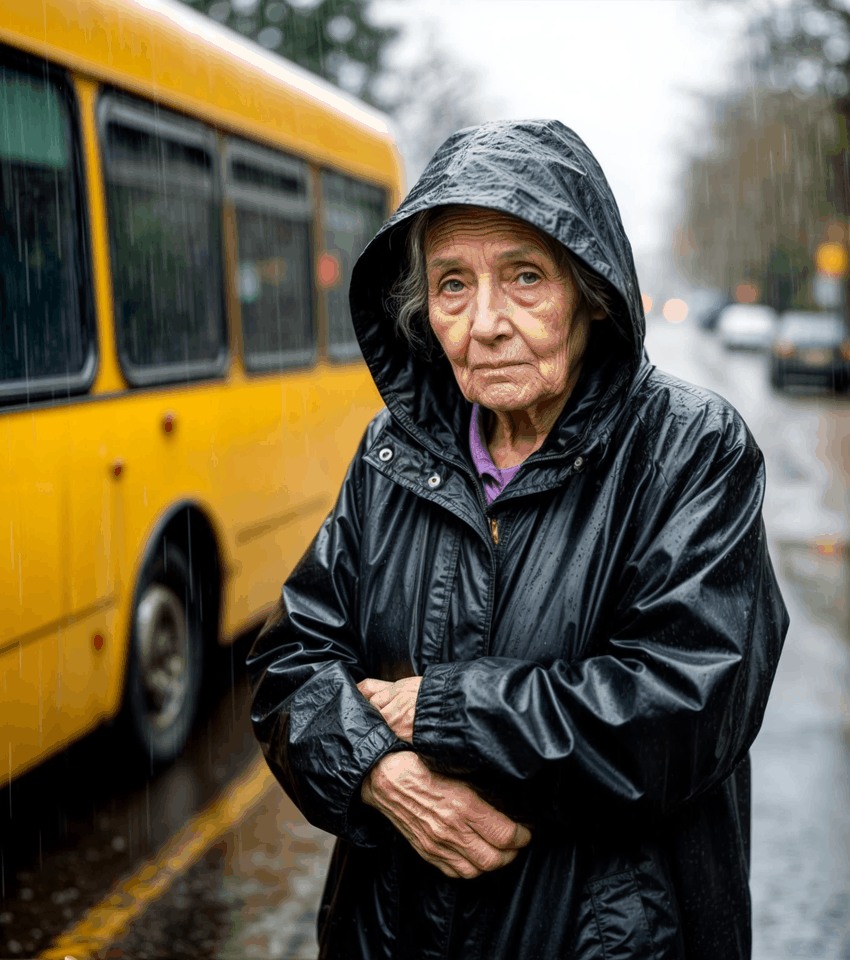The bus driver glanced sharply at the frail elderly woman clutching the handrail for support and barked, “Ma’am, you don’t have a ticket. You need to get off the bus.”
The vehicle was nearly empty. Outside, wet snowflakes drifted slowly, and the gray dusk had settled over the city. The woman said nothing, gripping her worn grocery bag tightly as she hesitated.
“I said get off! This isn’t a shelter!” the driver raised his voice with irritation.
A hush fell over the bus. Several passengers looked away, pretending not to notice. A young woman near the window bit her lip anxiously. A man wearing a heavy coat frowned but remained seated.
Slowly and with difficulty, the elderly lady shuffled toward the exit. The doors hissed open, letting in a cold gust of wind that brushed her face. She paused on the step and fixed her gaze on the driver.
Then, in a quiet but steady voice, she said:
“I once brought people into this world just like you—with love. And now I can’t even sit quietly on this bus.”
With that, she stepped down and walked away.
The bus stood still, its doors wide open. The driver averted his gaze, as if trying to escape his own conscience. Somewhere inside, a soft sob broke the silence. The girl by the window wiped tears away, and the man in the coat rose and walked toward the door. One by one, the passengers exited, leaving their tickets behind on the seats.
Within moments, the bus was empty except for the driver, who sat silently, the weight of unspoken remorse heavy on his heart.
Meanwhile, the old woman made her slow way along the snow-covered street. Her figure faded into the twilight, but every step radiated quiet dignity.
The next morning, the driver arrived at work as usual. The routine was the same—early morning, thermos of coffee, route schedule. Yet something inside him had shifted irreversibly.
He felt restless, barely slept, haunted by the memory of her eyes—not angry, not bitter, simply weary. And her words echoed relentlessly in his mind: “I once gave birth to people like you. With love.”
As he drove through the city, his eyes scanned the faces of elderly passengers at each stop, searching for her. Though unsure why—was it to seek forgiveness? To offer help? Or to acknowledge his shame?
Days passed.
One evening, as his shift was drawing to a close, he spotted a familiar silhouette at a stop near the old market—a small, stooped figure carrying the same worn bag and wearing the same threadbare coat.
He halted the bus, flung the doors open, and stepped outside.
“Grandma,” he said softly, “I’m sorry. Back then… I was wrong.”
She looked up at him and smiled gently—no anger, no reproach, just understanding.
He helped her onto the bus and seated her in the front. Along the way, he poured tea from his thermos and offered her a warm cup. They rode in silence—a different kind of silence, one filled with warmth and peace that eased their souls.
From that day forward, he always kept a few extra fare tokens tucked in his pocket—for those who couldn’t afford a ticket, especially the grandmothers.
Every morning before starting his route, he recalled her words. They had become more than a reminder of his guilt—they were a lesson in kindness and humanity.
Spring arrived suddenly. The snow melted fast, and soon little bouquets of snowdrops appeared at bus stops—grandmothers selling them in bunches of three wrapped in cellophane. He began recognizing their faces, greeting them warmly, helping them board. Sometimes, all he did was smile—and he could see how much it meant.
But the old woman he had met never returned.
He searched for her daily, asking around, describing her. Some said she lived near the cemetery beyond the bridge. On his days off, he went there on foot, without his uniform, without the bus, just walking and hoping.
One day, he found a modest wooden cross adorned with an oval-framed photo. Those same familiar eyes looked back.
He stood quietly for a long moment beneath the whispering trees, sunlight filtering softly through branches.
The following morning, a small bouquet of snowdrops rested on the front seat of his bus. He had picked them himself. Next to the flowers lay a cardboard sign he had carefully cut out by hand:
“For those forgotten, but who never forgot us.”
Passengers read the sign in silence. Some smiled. Others left a coin on the seat. And the driver simply continued on his route—slower, gentler. Sometimes he stopped a bit early so a grandmother could catch the bus.
Because now he understood: every grandmother is somebody’s mother. Every smile is someone’s gratitude. And every small kindness can transform a life.
